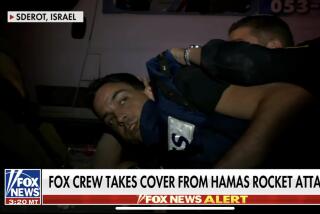Serbs’ Shrill TV Riling the West
- Share via
PALE, Bosnia-Herzegovina — Night after night, Bosnian Serb television warns its viewers of the dangers.
NATO aircraft enforcing peace in Bosnia are dropping poisons on Bosnian Serb communities, causing birth defects and deforestation, a broadcast advised last week. It showed footage from 1995 NATO airstrikes in Bosnia.
And in another broadcast: “Local scum from Muslim Sarajevo” are working with “Arabs, blacks, Mongolians and other experts of the international community” to take over Bosnian Serb institutions.
The commentaries on Srpska Radio and Television, or SRT, diplomats say, revive the harshest wartime rhetoric and are designed to inflame anti-West sentiment among Bosnian Serbs. SRT represents the most vivid example of how the continued influence of indicted war crimes suspect Radovan Karadzic, who controls the station, undermines peaceful rebuilding of the shattered country, the diplomats add.
As the chief propaganda machine for Bosnian Serb rulers, the television’s tenor has grown increasingly shrill since a power struggle involving Karadzic erupted late last month and after NATO troops on July 10 killed a war crimes suspect and arrested another--a “brutal murder and perfidious arrest,” as SRT describes it every evening.
And the counter-criticism coming from international officials is increasingly as harsh. They obliquely warn of reprisals as “robust” as the jamming of SRT’s signal.
On Monday, U.S. Ambassador to the United Nations Bill Richardson, in Sarajevo, the capital, on a fact-finding visit, added his criticism: “Attempts [by Bosnian Serbs] to use the state-controlled media to whip up fear and hostility toward [NATO] are extremely irresponsible and unwise.”
But while talk is tough, the options for punishment are limited.
Pulling the television’s plug, jamming its signal or deploying troops of the North Atlantic Treaty Organization to keep it off the air “are heavy-handed Soviet-style tactics that would be counterproductive,” warned one international official with long experience in the Balkans.
“The Soviets used to jam Voice of America and BBC radio in Poland, and it made [people there] want to listen to Voice of America and BBC even more. You can roll tanks and take over the station, and then what do you do?”
The SRT signal is heard and seen throughout eastern and northern Bosnia-Herzegovina and in a small portion of the area controlled by the Muslims and Croats. Little alternative television is available to most Bosnian Serbs.
Propaganda was the most insidiously effective tool during nearly four years of war in Bosnia, and introducing an objective media has been a principal goal of foreign peacemakers.
But as SRT director Miroslav Toholj said in an interview, Bosnian Serb authorities have no interest in being told how to run their airwaves.
“We have an obligation to our people,” Toholj said in his office at the television station, where the walls are graced with pictures of Karadzic, war crimes suspect Gen. Ratko Mladic and Karadzic proxy Momcilo Krajisnik of Bosnia’s three-person presidency.
“We are a company like CNN or ABC,” Toholj continued. “If an international organization does not like what we say, they can complain publicly. But doing anything beyond that would be catastrophic.”
Pondering the steps to take against Bosnian Serb television has opened a debate among international officials. To what extent do Western peacekeepers want to be in a position of infringing on what under many circumstances would be considered free speech?
Under the December 1995 peace agreement that ended Bosnia’s war and in accord with subsequent pacts, international monitors may require ethnocentric media to give more access to opposition voices and to refrain from inciting racial hatred. Peacekeepers believe that they have authority to “curtail” an offending broadcaster. But the political implications may be too risky, these officials say.
NATO officers have warned civilian officials that a military operation to occupy SRT headquarters--a somewhat shabby three-story building in the center of Pale, the Bosnian Serb capital--could turn violent and leave the offices so heavily damaged that it could take up to six weeks to return to the air.
A more palatable plan is to create alternative outlets, but efforts to do that during the past two years have largely failed. The most ambitious project is a $10.5-million television network called TV-IN, which is paid for by the U.S. and European governments and the private Soros Foundation. Its influence is minimal, its technical and journalistic quality inferior, and the Sarajevo-based network is not trusted by Serbs or Croats.
Even in the northern city of Banja Luka, arguably the least hard-line portion of Bosnian Serb territory, a survey released Monday showed that fewer than one-half of 1% of the people watch TV-IN. Nearly half said they are regular viewers of SRT.
SRT’s current campaign of hyperbole began after Bosnian Serb President Biljana Plavsic accused Karadzic of corruption and tried to fire his cronies who occupy key positions in government. Television lashed out at Plavsic, accused her of conspiring with the West to sacrifice Karadzic and Republika Srpska, the Serb-controlled portion of Bosnia.
SRT compared Plavsic to Adolf Hitler after people purporting to be her supporters burned copies of a pro-Karadzic newspaper.
Most ominously, international officials believe the rhetoric is inciting Bosnian Serbs to violence against Western peacekeepers, who have been targeted by daily, if minor, explosions and attacks in the past 10 days. After a number of Serbian residents were ordered to deny housing and restaurant service to Westerners, television reported the phenomenon as a “spontaneous” decision by many Bosnian Serbs--”a people’s boycott.”
More to Read
Sign up for Essential California
The most important California stories and recommendations in your inbox every morning.
You may occasionally receive promotional content from the Los Angeles Times.














